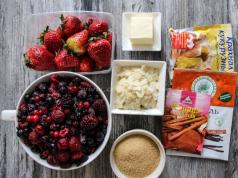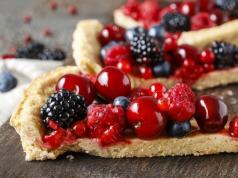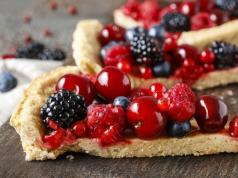This variety is known not only to coffee gourmets. Everyone who considers themselves fans of this drink has heard about it at least once. Jamaica Blue Mountain is made from grains grown in the mountain plantations of the island of Jamaica, which is reflected in the name. The "Blue Mountains" occupy the eastern part of the island, and not all slopes are cultivated, but only the most fertile ones. The natural and climatic conditions of the region provide an almost ideal vegetation of trees. They grow under the shade of century-old trunks, bushy bananas or avocados, providing great taste qualities grains.
Jamaica Blue Mountain is one of the most expensive varieties in the world. A harmonious combination of taste and aroma, moderate astringency and sweetness, a slight nutty flavor and slight acidity - all this makes it unique. You can appreciate all the shades of the Jamaica Blue Mountain flavor palette only immediately after roasting.
Most of the world market for coffee beans from the Blue Mountains belongs to Japan. The Land of the Rising Sun buys up about 90% of the crop, annually spending $15 million on it. The rest is exported to various countries, but the United States buys most of it.
Order Jamaica Blue Mountain online
In the Country of Coffee online store you can buy a unique elite Jamaica coffee Blue Mountain from the Jamaican highlands on favorable terms. It will enchant you with the versatility of taste and richness of aroma from the first cup. Indulge in the pleasure of enjoying the taste of an authentic Jamaica Blue Mountain drink. Place an order on our website right now. We offer:
wide range of; acceptable cost of production; free consultations of professionals; delivery to any region.
The history of Jamaica Blue Mountain coffee, a true legend in the coffee industry, spans more than one century. So, in 1728, Sir Nicholas Lawes, governor of Jamaica and owner of the famous Temple Hall, brought the first coffee tree to the island. Initially plantations were set up in the hilly area of St. Andrew County, and then they gradually moved to the rich lands of the Blue Mountains - the longest and most amazing mountain range in Jamaica. The coffee industry of the state, from its inception to the present day, has experienced both incredible ups and downs.
From 1800 to 1840, Jamaica produced about 70,000 tons of excellent coffee annually, making it the largest supplier of elite coffee raw materials in the world. In 1838, a law was passed that abolished slavery on the island, which led to the destruction and death of many coffee plantations. Very soon, due to a lack of labor, the coffee industry fell into decline, and by 1891 it was on the verge of complete collapse. Gourmets would never again be able to enjoy the impeccable Jamaica Blue Mountains coffee if the country's government had not taken action - a system of control over the cultivation and production of coffee was introduced. Most attempts to restore the coffee industry were unsuccessful, since by that time Jamaica had already lost important markets, including the main market - Canada. Finally, in 1944, the authorities formed the Central Coffee Clearing House, whose task was to control the supply of green coffee abroad and the quality of exported products.  After a devastating hurricane swept over Jamaica in 1951, only three tiny plantations in the Blue Mountains survived. Then the farmers took a sip of grief - they had to re-establish their crops. Help came from the government in the form of a new government body, the Coffee Industry Board, formed to control the quality of Jamaican coffee. Slowly, the production of Jamaica Blue Mountain coffee "on the mend", and in 1973 the famous coffee plants Mavis Bank, Silver Hill, Moy Hall and Wallenford finally officially registered the Blue Mountain Coffee brand. A few years ago, another family company, Old Tavern Estate Coffee, received the exclusive right to produce a product under the Jamaica Blue Mountain brand of coffee.
After a devastating hurricane swept over Jamaica in 1951, only three tiny plantations in the Blue Mountains survived. Then the farmers took a sip of grief - they had to re-establish their crops. Help came from the government in the form of a new government body, the Coffee Industry Board, formed to control the quality of Jamaican coffee. Slowly, the production of Jamaica Blue Mountain coffee "on the mend", and in 1973 the famous coffee plants Mavis Bank, Silver Hill, Moy Hall and Wallenford finally officially registered the Blue Mountain Coffee brand. A few years ago, another family company, Old Tavern Estate Coffee, received the exclusive right to produce a product under the Jamaica Blue Mountain brand of coffee.
Today, Jamaica is one of the leaders in the creation the best varieties coffee. What makes this small island a unique place to grow premium coffee varieties? Jamaica is "very lucky" with climate and geography - the famous Blue Mountains proudly rise above the island, which give life amazing coffee. For optimal growth  coffee trees need adequate moisture, perfect drainage, and a cool climate. The Blue Mountains can give all this to culture! To be called Jamaica Blue Mountain coffee, the beans must be grown at an altitude of 2000 to 5000 meters above sea level, in an area whose boundaries are established by law. Everything else is fake. real coffee Jamaica Blue Mountain is a selection of Arabica beans grown "under the supervision" of true professionals in their field.
coffee trees need adequate moisture, perfect drainage, and a cool climate. The Blue Mountains can give all this to culture! To be called Jamaica Blue Mountain coffee, the beans must be grown at an altitude of 2000 to 5000 meters above sea level, in an area whose boundaries are established by law. Everything else is fake. real coffee Jamaica Blue Mountain is a selection of Arabica beans grown "under the supervision" of true professionals in their field.
Currently, the volume of "blue" coffee produced is only 1000-1500 tons per year. On a global scale, this amount is equivalent to 0.1% of all coffee produced in Colombia, so it is almost impossible to buy Jamaica Blue Mountain coffee on the world market. About 90% of the legendary product is bought by Japan, and the remaining 10% is shared by England, the USA, and since 2009, thanks to Jamaica Blue Mountain Rus LLC, and Russia.
Jamaica Blue Mountain Coffee is now internationally recognized and widely regarded as the best coffee in the Caribbean and possibly the best coffee in the world!
Blue Mountain coffee is a rare and expensive coffee variety, it is considered a masterpiece among classic varieties.
Shelf life in a package of 200 grams- 6 months.
Packaged 1000 grams- 12 months.
Delivery- in one day.
Blue Mountain coffee is grown on the Blue Mountains of Jamaica. This is a rare and expensive coffee variety, it is considered a masterpiece among classic varieties.
Coffee Jamaica Blue Mountain (Blue Mountain) is grown on small plantations, which are located on the slopes adjacent to the top of the Blue Mountain at an altitude of more than 2000 meters above sea level, surrounded by mango and papaya trees. All coffee in the world is shipped and measured in bags, but only this Jamaican coffee comes in special wooden kegs. This is due to the fact that the quantity of this variety is limited, and it is worth its weight in gold.
Interesting Fact About Blue Mountain Coffee
Interestingly, it was Blue Mountain coffee (Jamaica) that was the favorite of the legendary musician John Lennon. When he came to Tokyo with his wife Yoko Ono, he always stayed at the Okura Hotel in a room on the 13th floor. And every morning the owners of the hotel treated the couple to John's favorite coffee: they brought Blue Mountain coffee (Jamaica Blue Mountain) to the spouses.
This variety was also a favorite of the literary father of superspy James Bond, Ian Fleming. Writer for a long time lived in Jamaica, and Blue Mountain Jamaica became his favorite. It is about this variety in one of the novels that James Bond speaks.
Jamaican Blue Mountain coffee is distinguished by its subtle and delicate taste completely devoid of bitterness. This Jamaican coffee has a marvelous vinous aroma and rich aftertaste. No wonder who is also called royal. This is a truly elite variety that will not leave indifferent any coffee gourmet.
Specifications
Type of coffee: Arabica
Variety: typical
Processing way: washed
Harvest: 2012/13
Package: wooden barrel
The history of Blue Mountain Jamaica began with the decision of French King Louis XV to plant coffee on the island of Martinique, a French colony 1,900 kilometers southwest of Jamaica. Five years later, in 1728, the governor of Jamaica received a coffee tree as a gift from the governor of Martinique. A plantation was grown from the tree, and nine years later the first coffee export from Jamaica took place. So coffee production was born on this island.
Jamaica's soil, rich in nitrogen and phosphorus, is excellent for growing Arabica. The best soil is found on the steep slopes of the Blue Mountains, located in the eastern part of the island north of Kingston, the capital of Jamaica, and south of Port Maria and Port Antonio.
The climate of the Blue Mountains is also ideal for coffee production: Jamaica Blue Mountain grows at an altitude of up to 1800 meters above sea level, and the total planting area is about 60 square kilometers. Most coffee is produced by small farmers, but there are also large plantations up to 0.7 square kilometers in size. In total, Jamaica Blue Mountain produces 25,000 small and large farms.
The result of the painstaking work of Jamaican farmers is one of the best coffee in the world - Jamaica Blue Mountain, or, as it is sometimes called, Champagne of the coffee world. Just as France's Appelation D'Origine Contrôlée Champagne controls the production areas for authentic champagne, the Jamaica Blue Mountain coffee production area is strictly defined. The annual production of Jamaica Blue Mountain ranges from 1000 to 1350 tons, which corresponds to 0.1% of Colombia's annual production. Colombia produces more coffee per day than Jamaica Blue Mountain produces in a year!
The exclusivity and scarcity of Jamaica Blue Mountain is emphasized by the fact that it is the only coffee in the world exported in wooden barrels.
However, the high cost of Jamaica Blue Mountain is determined not only by demand that exceeds supply. Quality control of exported grain also has its own history. In 1944, the Jamaican government launched the Central Coffee Export Processing Project, which processed and controlled the quality of all exported coffee. Another important government decision was the creation of the Jamaica Chamber of Coffee Industry in 1950.
Today, every barrel of coffee passes through the Chamber for quality control before export. In addition, the Jamaica Chamber of Coffee Industry sets mandatory standards for growing, harvesting, processing (washed Arabica only) and marketing Jamaica Blue Mountain coffee.
85-90% of Jamaica's Blue Mountain crop goes to Japan, which required Jamaica to sign an agreement in early 2008 on the amount of pesticide and chemical residues in coffee exports. The requirements of the Japanese side significantly exceed the standards adopted in the European Union and other European countries. Thanks to this agreement, all coffee exported from Jamaica today meets these high standards.
Only coffee certified by the Jamaica Chamber of Coffee Industry may use the Jamaica Blue Mountain Registered Trademark.
Our Jamaica Blue Mountain comes from a Clydesdale grower whose first farm was established in the late 18th century. Dr. Colin McClarty. Along with another producer, Mavis Bank, Clydesdale is today Jamaica's largest exporter of Blue Mountain. Clydesdale Procures coffee berries from farmers throughout Jamaica's Blue Mountain area, and the coffee is processed at Blue Mountain Coffee Processors Ltd. in Kingston.
Another manufacturer that brings us Jamaica Blue Mountain is RSV Estate.
The taste of Jamaica Blue Mountain is very interesting: an excellent balance of intense but restrained sourness, the necessary richness and peppery spice notes, velvety body. Jamaica has a complex and heterogeneous taste, the components of which are constantly fighting for the right to dominate the cup: this coffee is sour, sweet and spicy at the same time. An excellent range of flavors, a surprisingly clean cup and a great peppery aftertaste.
If you like varieties with more uniform tastes, we recommend that you familiarize yourself with other varieties from ours.
Video
The history of Jamaica Blue Mountain coffee begins in 1723, when King Louis XV sent three coffee seedlings to the French colony of Martinique, an island located 1,900 kilometers southwest of Jamaica. In 1728, Sir Nicholas Laves, governor of Jamaica, received one of the coffee seedlings as a gift from the governor of Martinique. This seedling was cultivated and over time grew a whole plantation. From 1728 to 1768, coffee was mainly grown in the foothills of Mount St. Andrews (St. Andrews), but over time, farmers began to move to the Blue Mountains (Blue Mountain), the conditions in which most met the requirements of the whimsical coffee tree. Thus, one of the most prestigious and expensive coffee in the world.
Areas under coffee expanded rapidly and by 1800 there were 686 plantations. In 1814, exports amounted to 15,199 tons. With the abolition of the slave trade, production dropped sharply, largely due to a lack of labor. By 1850, only 186 plantations were in operation, and exports had dropped to 1,486 tons.
In 1953, the Jamaican government created the Coffee Industry Board (CIB) of Jamaica, a regulatory body dedicated to protecting the quality of Jamaican coffee. Jamaica was the first country in the world to establish a geographically defined coffee variety, just as French winemakers do with their Appellation d'Origine Controlleé.
"Jamaica Blue Mountain" is not trademark, but a geographic trade name. The name Jamaica Blue Mountain can only be carried by coffee grown on a high-altitude coffee plantation in the area of the same name. The area of the Blue Mountain region, where coffee is grown, is only 350 square kilometers. The boundaries of the area are legally limited by the regulations of the Jamaica Coffee Industry Council, and only coffee grown in the specified area and processed by regulated companies can be called "Blue Mountain".
All coffee exported from Jamaica is supplied by CIB. Strict quality control by highly qualified specialists ensures that all exported coffee is fully consistent with the Jamaica Blue Mountain variety. Despite the fact that there is a tradition in world practice to measure coffee in bags, the Jamaican Blue Mountain variety is considered in barrels. It is the only coffee in the world supplied in wooden barrels.
Jamaica Blue Mountain coffee is a very aromatic and balanced variety with dark bitter chocolate, caramel, tobacco and pepper flavors, buttery richness and mild grape acidity. A pleasant long aftertaste impresses with creamy-nutty shades with subtle spicy motifs of Borodino bread. It is one of the most expensive coffees in the world. The volcanic soil of the Jamaican mountains, rich in phosphorus and nitrogen, and regular rainfall give this coffee a rich taste. And the alternation of hot days and cold nights contributes to the long maturation of coffee beans.








